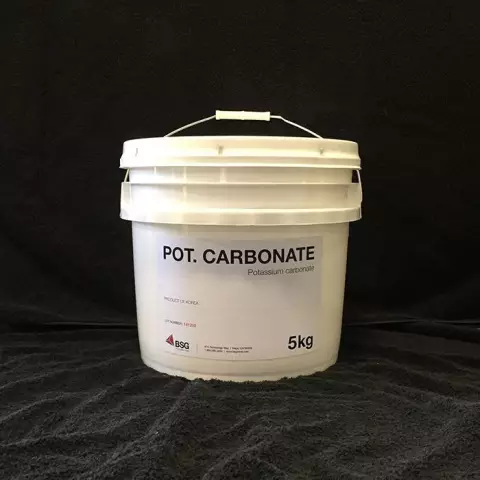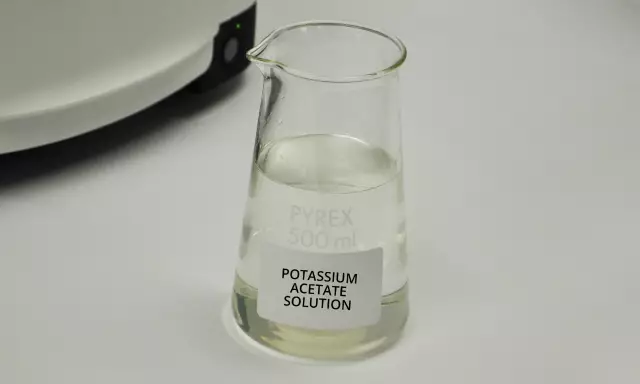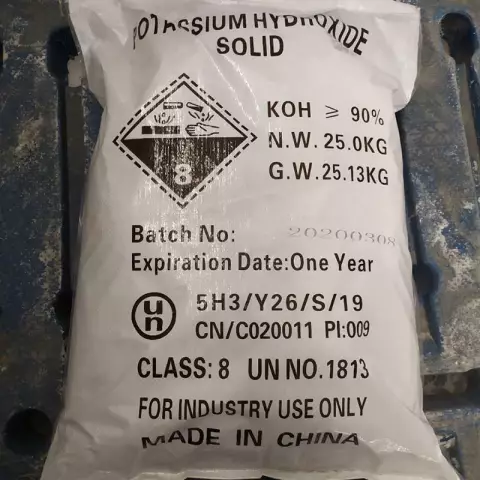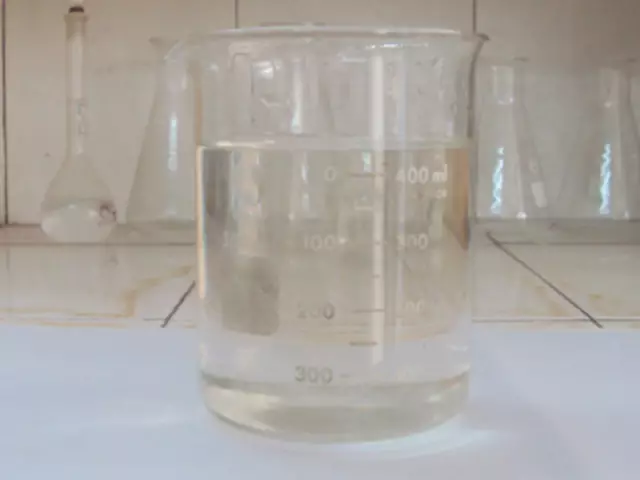- Author Rachel Wainwright wainwright@abchealthonline.com.
- Public 2023-12-15 07:39.
- Last modified 2025-11-02 20:14.
Potassium iodide
Potassium iodide: instructions for use and reviews
- 1. Release form and composition
- 2. Pharmacological properties
- 3. Indications for use
- 4. Contraindications
- 5. Method of application and dosage
- 6. Side effects
- 7. Overdose
- 8. Special instructions
- 9. Application during pregnancy and lactation
- 10. Use in childhood
- 11. In case of impaired renal function
- 12. Drug interactions
- 13. Analogs
- 14. Terms and conditions of storage
- 15. Terms of dispensing from pharmacies
- 16. Reviews
- 17. Price in pharmacies
Latin name: Potassium iodide
ATX code: H03CA
Active ingredient: potassium iodide (potassium iodide)
Manufacturer: Ozone LLC (Russia), Medisorb (Russia), Obolenskoye - pharmaceutical company CJSC (Russia), V-MIN LLC (Russia), Pharmzashchita NPC (Russia), etc.
Description and photo update: 2019-19-08
Prices in pharmacies: from 53 rubles.
Buy

Potassium iodide is an iodine preparation for the treatment and prevention of thyroid diseases.
Release form and composition
Dosage form of Potassium iodide - tablets: almost white or white, round biconvex shape, with a dividing line on one side (0.1 or 0.2 mg in a blister strip: 10, 30 or 50 pcs., In a cardboard pack from 1 to 10 packs, 25 pcs., in a cardboard box 2 or 4 packs, 10, 20, 30, 40, 50 or 100 pcs. in a can, in a cardboard box 1 can; 40 mg each: 10 pcs.. in a contour acheikova packing, in a cardboard bundle 1 package, 50, 100, 1000, 5000 or 10000 pcs. in cans; 125 mg each: 10 pcs. in a contour acheikova packing, in a cardboard bundle 1, 2, 3 or 5 packages, 50, 100 or 1000 pcs. in a can).
The active substance is potassium iodide, in 1 tablet: 0.131 mg (which corresponds to 0.1 mg of iodine), 0.262 mg (which corresponds to 0.2 mg of iodine), 40 mg or 125 mg.
Auxiliary components: microcrystalline cellulose, lactose monohydrate (milk sugar), sodium carboxymethyl starch, magnesium stearate, colloidal silicon dioxide, corn starch.
Pharmacological properties
Pharmacodynamics
Iodine is an essential trace element necessary for the normal functioning of the thyroid gland. Iodine ions, entering the epithelial cells of the thyroid follicle in the form of iodides, are oxidized under the influence of the enzyme iodide peroxidase, as a result of which elemental iodine is formed - it is included in the tyrosine molecule. In this case, one part of the tyrosine radicals in thyroglobulin is iodized, as a result of which thyronines are formed, the main of which are triiodothyronine (T 3) and thyroxine (T 4). Thyronines form a complex with the protein thyroglobulin, which is deposited (retained) in the colloid of the thyroid follicle.
Entering the body in physiological amounts, iodine prevents the development of endemic goiter (due to the lack of this element in food), normalizes the size of the thyroid gland in children (including newborns), and also affects the concentration of thyroid-stimulating hormone, and the ratio of thyronines T 3 and T 4.
Pharmacokinetics
Potassium iodide, entering the body after taking the drug inside, is quickly and completely absorbed in the small intestine. Within 2 hours, it is distributed in the intracellular space. It accumulates mainly in the thyroid gland (concentration exceeds 0.5 mg / g of tissue), gastric mucosa, mammary and salivary glands. It penetrates well through the placenta.
It is excreted mainly by the kidneys (10 minutes after taking the tablet, trace amounts are determined in the urine, 80% of the dose taken is excreted within 48 hours, the rest - within 10-20 days), to a lesser extent - with secretions of sweat, bronchial, salivary and other glands.
Indications for use
- Treatment and prevention of endemic goiter;
- Prevention of goiter recurrence during complex therapy with thyroid hormone preparations.
Contraindications
- Latent hyperthyroidism (for taking doses exceeding 0.15 mg per day);
- Severe hyperthyroidism;
- Toxic adenoma;
- Dermatitis herpetiformis, or Duhring's disease;
- Diffuse or nodular toxic goiter (for doses of 0.3-1 mg per day);
- The period of pregnancy and breastfeeding (for use in daily doses of 1-2 mg);
- Hypersensitivity to drug components.
Instructions for the use of Potassium iodide: method and dosage
The dosage of potassium iodide is prescribed by the doctor individually, taking into account the clinical indications and the patient's age.
The recommended daily dosage in terms of iodine for adolescents and adults is 0.1-0.2 mg, for children - 0.05-0.1 mg.
Side effects
The use of potassium iodide can cause iodism, with manifestations in the form of urticaria, angioedema, edema of the nasal mucosa, eosinophilia, shock.
In addition, side effects of therapy can be: sleep disturbances, irritability, increased sweating, tachycardia, in patients over 40 years old - diarrhea.
In some patients, when taking the drug in a daily dose above 0.3-1 mg, there is a risk of developing hyperthyroidism, the likelihood of the disease is higher in elderly patients, in the presence of diffuse or nodular toxic goiter.
With therapy in doses of more than 1 mg per day, the patient may develop goiter, hypothyroidism.
Overdose
When taking potassium iodide in daily doses of more than 0.15 mg, latent hyperthyroidism can turn into a manifest form. In the case of prolonged use of the drug in daily doses of more than 0.3 mg, there is a risk of iodine-induced hyperthyroidism, especially in elderly people, patients with nodular goiter and toxic adenoma.
Symptoms of acute iodine overdose: staining of mucous membranes in brown color, abdominal pain, reflex vomiting, diarrhea; sometimes melena; in severe cases, dehydration, shock.
For the treatment of an overdose, gastric lavage should be done first. The following shows the introduction of sodium thiosulfate, correction of violations of the water-electrolyte balance. If necessary, anti-shock therapy is performed.
In case of chronic overdose, iodism may develop, manifested by the following symptoms: a metallic taste in the mouth, swelling of the salivary glands, edema and inflammation of the mucous membranes (conjunctivitis, rhinitis, bronchitis, gastroenteritis), fever, dermatitis, acne, irritability. In case of chronic overdose, the abolition of iodine preparations is required.
special instructions
Hyperkalemia may develop in patients with renal insufficiency while using potassium iodide.
Iodine crosses the placenta and is excreted in breast milk, exceeding the recommended doses can lead to the development of hypothyroidism and goiter in the fetus or infant.
Influence on the ability to drive vehicles and complex mechanisms
According to the instructions, potassium iodide does not adversely affect the cognitive and psychomotor functions of a person.
Application during pregnancy and lactation
The need for iodine increases during pregnancy and lactation. Potassium iodide tablets are recommended to be taken in cases when the daily intake of iodine with food is less than 0.15-0.3 mg.
Penetrating well through the placenta, iodine can contribute to the development of goiter and hypothyroidism in the fetus. Iodine is also excreted in breast milk. For this reason, pregnant and breastfeeding women should strictly adhere to the dosage regimen recommended by the doctor.
Pediatric use
For children, potassium iodide tablets are prescribed for the prevention and treatment of diffuse euthyroid goiter. There are no age restrictions, the drug can be used even in newborns. Children who cannot swallow the tablet, including infants, are advised to dissolve it in a small amount (1 tablespoon) of chilled boiled water.
With impaired renal function
In patients with impaired renal function, the drug can cause the development of hyperkalemia, therefore, Potassium iodide should be used with caution, under constant monitoring of the concentration of potassium in the blood.
Drug interactions
With the simultaneous administration of high doses of iodine with lithium preparations, goiter and hypothyroidism may develop, potassium-sparing diuretics - hyperkalemia.
The absorption of iodine by the thyroid gland stimulates thyroid-stimulating hormone or TSH, and thiocyanate and perchlorate competitively inhibit.
When antithyroid drugs are combined, their action is mutually weakened.
Analogs
Potassium iodide analogs are: Iodomarin 100, Iodomarin 200, Vitrum Iodine for children, Iodandin, Iodbalance.
Terms and conditions of storage
Store in a dry place at temperatures up to 25 ° C. Keep out of the reach of children.
The shelf life is 3 years.
Terms of dispensing from pharmacies
Available without a prescription.
Reviews of potassium iodide
According to reviews, Potassium iodide is an effective drug used to replenish iodine deficiency. Its main advantage, provided that it is equally effective with other iodine preparations, patients consider its low cost.
The price of potassium iodide in pharmacies
Approximate prices for Potassium iodide: 100 tablets of 0.1 mg - 58-77 rubles; 100 tablets of 0.2 mg - 87-123 rubles.
Potassium iodide: prices in online pharmacies
|
Drug name Price Pharmacy |
|
Potassium iodide 0.1 mg tablets 100 pcs. RUB 53 Buy |
|
Potassium iodide Reneval 100 mcg tablets 112 pcs. RUB 59 Buy |
|
Potassium iodide Reneval 200 mcg tablets 112 pcs. RUB 65 Buy |
|
Potassium iodide 0.1 mg tablets 100 pcs. RUB 67 Buy |
|
Potassium iodide tablets 100mcg 100 pcs. RUB 86 Buy |
|
Potassium iodide 0.2 mg tablets 100 pcs. 92 RUB Buy |
|
Potassium iodide tablets 0.2mg 100 pcs. 106 RUB Buy |
|
Potassium iodide tablets 200mkg 100 pcs. RUB 111 Buy |
|
Potassium iodide 0.2 mg tablets 100 pcs. RUB 111 Buy |
| See all offers from pharmacies |

Anna Kozlova Medical journalist About the author
Education: Rostov State Medical University, specialty "General Medicine".
Information about the drug is generalized, provided for informational purposes only and does not replace the official instructions. Self-medication is hazardous to health!






